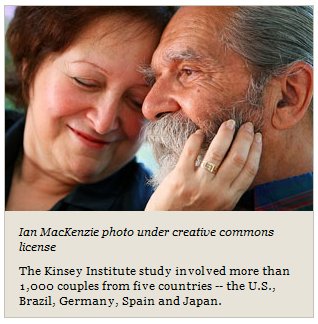BLOOMINGTON, Ind. -- Cuddling and caressing are important ingredients for long-term relationship satisfaction, according to an international study that looks at relationship and sexual satisfaction throughout committed relationships, but contrary to stereotypes, tenderness was more important to the men than to the women.
 The Kinsey Institute study involved more than 1,000 couples from five countries -- the U.S., Brazil, Germany, Spain and Japan.
The Kinsey Institute study involved more than 1,000 couples from five countries -- the U.S., Brazil, Germany, Spain and Japan.
Also contrary to expectations of the researchers, men were more likely to report being happy in their relationship, while women were more likely to report being satisfied with their sexual relationship. The couples, more than 1,000 from the United States, Brazil, Germany, Japan and Spain, where together an average 25 years.
The study from the Kinsey Institute at Indiana University, published in the Archives of Sexual Behavior, is the first to examine sexual and relationship parameters of middle-aged or older couples in committed, long-term relationships. Research efforts to understand the place of sexuality in human lives rarely involves intact couples in ongoing relationships.
"You hear repeated research and commentary about divorce; but it's important to note that though divorce rates are high in the U.S., couples tend to stay married -- more than 50 percent of U.S. couples remain in their first marriage, and that number goes up to 90 percent in Spain," said Julia Heiman, director of The Kinsey Institute for Research in Sex, Gender and Reproduction and lead author of the article. "We know from other research that being in a long-term relationship has some value to health. Perhaps we can learn more about what makes relationships both sustainable and happy." Julia Heiman
 Participants in the study were 40- to 70-year-old men and their female partners, either married or living together for a minimum of one year. The study included around 200 couples from each country. The men and women answered gender-specific questionnaires and were assured that their responses would not be shared with their partner.
Participants in the study were 40- to 70-year-old men and their female partners, either married or living together for a minimum of one year. The study included around 200 couples from each country. The men and women answered gender-specific questionnaires and were assured that their responses would not be shared with their partner.
"This study on heterosexual couples provides a basis for future research on sex and gender, such as how same-sex couples may or may not show similarities and differences in relationship and sexual satisfaction," Heiman said.
Relationship Satisfaction
For men, relationship happiness was more likely if the man reported being in good health and if it was important to him that his partner experienced orgasm. Surprisingly, frequent kissing or cuddling also predicted happiness in the relationship for men, but not for women. Both men and women reported more happiness the longer they had been together, and if they themselves scored higher on several sexual functioning questionnaires.
Across all five nationalities, for both men and women, the Japanese were significantly happier with their relationships than Americans, and Brazilians and Spanish reported less relationship happiness than Americans.
Sexual Satisfaction
Men and women both were likely to report sexual satisfaction if they also reported frequent kissing and cuddling, sexual caressing by the partner, higher sexual functioning, and if they had sex more frequently. On the other hand, for men, having had more sex partners in their lifetime was a predictor of less sexual satisfaction.
Men did report more relationship happiness in later years, whereas for women, their sexual satisfaction increased over time. Women who had been with their partner for less than 15 years were less likely to report sexual satisfaction, but after 15 years, the percentage went up significantly.
"Possibly, women become more satisfied over time because their expectations change, or life changes with the children grown," Heiman said. "On the other hand, those who weren't so happy sexually might not be married so long."
Compared with the U.S. men, Japanese men reported significantly (2.61 times) more sexual satisfaction in their relationships. For women, Japanese and Brazilian women were more likely to report being satisfied sexually than Americans.
"We recognize that relationship satisfaction and sexual satisfaction may not be the same thing for all couples, and in all cultures," Heiman said. "Our next step is to understand how one person's health, physical affection and sexual experiences relate to the relationship happiness or sexual satisfaction of his or her partner. So, we hope for more couple-centered than individual-centered understanding on relationship functioning and satisfaction."
Co-authors of the study are J. Scott Long and Shawna N. Smith, Indiana University; William A. Fisher, University of Western Ontario, London, Canada; and Michael S. Sand and Raymond C. Rosen, New England Research Institutes, Mass.
The study is available at http://www.kinseyinstitute.org/publications/PDF/Heiman couples midlife and older 5 countries.pdf.
The study was supported by an independent investigator-initiated grant from Bayer-Schering. The Kinsey Institute receives support from the Office of the Vice Provost for Research at IU Bloomington (OVPR). OVPR is dedicated to supporting ongoing faculty research and creative activity and developing new multidisciplinary initiatives to enhance opportunities for federal, state, and private research funding.
Copyright © 2010 The Trustees of Indiana University
